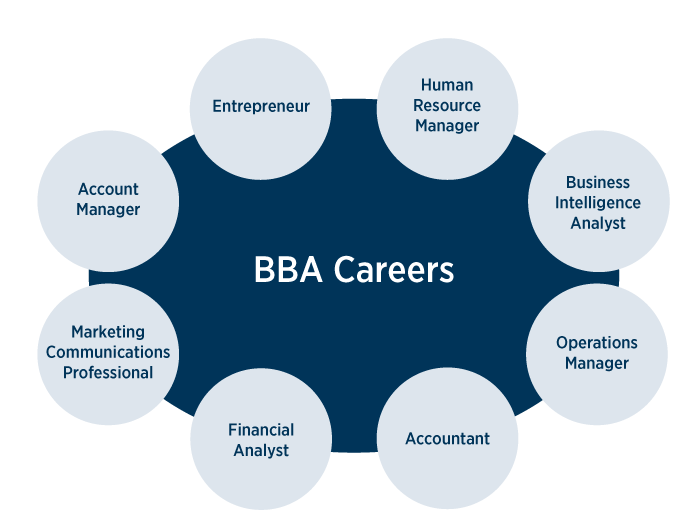
- jaro education
- 28, April 2024
- 10:00 am
After completing a Bachelor of Business Administration (BBA), many students find themselves at a crossroads, pondering the next step in their academic and professional journey. The main question is: ‘After BBA, which course is best?’ This query resonates with countless graduates, as they seek clarity in between the myriad of career possibilities. While the horizon may seem vast and uncertain, there exist numerous avenues for those equipped with a BBA degree to carve out fulfilling and prosperous careers. Yet, not all students are fully aware of the diverse pathways available to them post-graduation.
In this blog, you will get to know the various career options available to BBA graduates. You will also get broader ideas on lesser-known yet promising paths that can lead to stable employment and fulfillment of professional dreams.
What is a Bachelor of Business Administration (BBA)
Table of Contents
BBA is a three-year program in Business Administration that students can undertake after finishing their 12th grade in any academic stream. This program focuses on developing administrative skills and is considered advantageous for one’s future career prospects. Students can choose from various specializations within the BBA program to gain a comprehensive understanding of the subject matter.
A Bachelor of Business Administration (BBA) degree offers several advantages for those considering a career in business. Here are the top reasons why pursuing a BBA is a smart choice:
1. Versatility: A BBA degree goes beyond merely preparing you for a specific job. It combines theory, practical knowledge, and personality development. You’ll acquire a diverse skill set that makes you a well-rounded professional, ready for success.
2. Broad Knowledge Base: BBA programs cover various subjects, including accounting, finance, marketing, operations, human resources, business law, and communication. This breadth of knowledge equips you to handle different aspects of business management.
3. Practical Application: Unlike purely theoretical degrees, BBA programs emphasize practical application. You’ll learn how to apply business concepts and theories in real-world organizational settings.
4. Business Acumen: BBA degrees develop your business acumen, decision-making abilities, and leadership skills. These qualities stand out on your CV and in the workplace.
5. Career Opportunities: BBA graduates are prepared for entry-level management roles across various industries. Whether you aspire to work in a large corporation or start your own business, a BBA degree opens doors.
6. Foundation for Further Education: If you plan to pursue an MBA or other business-related credentials, a BBA provides an excellent foundation.
You can enroll in the Online BBA Degree Programme – Symbiosis School for Online and Digital Learning (SSODL) to gain modern knowledge and skills. Developed by top experts from Symbiosis, this cutting-edge curriculum covers specializations like Marketing, Human Resources, Accounting and Finance, Environment Management, Data Analytics, International Business, Hospital and Healthcare Management, and Entrepreneurship.
Top Job Opportunities after BBA

*Linkedin.com
Associate:
Associates typically work under the guidance of senior team members and contribute to tasks such as data analysis, market research, report preparation, and project management. Associates often collaborate across departments to gather information, compile reports, and assist in decision-making processes. Their responsibilities may also include coordinating meetings, maintaining documentation, and communicating with stakeholders.
This role is an excellent entry point for recent BBA graduates to gain hands-on experience in a professional setting and develop a solid foundation in business administration. In India, associates typically earn an average salary of ₹7.6 lakhs per year, ranging from ₹1.8 lakhs to ₹16.0 lakhs, as per Ambitionbox.
Analyst:
Business analysts specialize in analyzing data and information to provide actionable insights and recommendations. They gather and interpret financial data, market trends, customer behavior, and operational metrics to identify strengths, weaknesses, opportunities, and threats (SWOT analysis). Business analysts often use tools such as spreadsheets, databases, and data visualization software to present their findings in clear and concise reports. Their analyses help businesses make informed decisions regarding resource allocation, strategic planning, product development, and performance improvement initiatives.
The salary range for Business Analysts in India spans from ₹2.9 Lakhs to ₹16.7 Lakhs, with an average annual salary of ₹9.6 Lakhs, as per Ambitionbox.
Business Development Executive:
Business development executives are strategic professionals responsible for driving growth and expansion opportunities for a company. They identify potential clients or markets, conduct market research to assess demand and competition and develop strategies to acquire new business opportunities. Business development executives build and maintain relationships with clients, negotiate contracts, and collaborate with sales, marketing, and product teams to align business goals and strategies. They play a key role in exploring new revenue streams, launching new products or services, and expanding the company’s market presence. This role requires strong communication, negotiation, analytical, and networking skills, making it an exciting and challenging career path for BBA graduates interested in sales and strategic planning.
The estimated salary for a Business Development Executive in India is around ₹6,84,000 per year. On top of that, they often receive additional cash compensation averaging around ₹2,58,000, with amounts ranging from ₹2,40,000 to ₹2,76,000, as per Glassdoor.
Customer Services & Operations Analyst:
Professionals in this role, play a dual function within an organization. Firstly, they focus on analyzing customer service processes to ensure that customers receive exceptional support and assistance. This involves monitoring customer interactions, identifying areas for improvement, and implementing strategies to enhance overall customer satisfaction.
Secondly, they also analyze operational processes and workflows to optimize efficiency and effectiveness. This may include evaluating supply chain logistics, inventory management systems, and workflow automation tools. By combining insights from both customer service and operations analysis, these analysts contribute to improving the overall customer experience and operational performance of the company.
The typical annual salary for a Customer Service Operations Analyst in India is ₹11,04,419. Additionally, the average extra cash compensation for this role ranges from ₹6,96,593 to ₹7,46,424, with an average of ₹7,21,508, according to Glassdoor.
Operations Executive:
Operations executives are responsible for supervising the day-to-day activities and processes that keep a business running smoothly. They play a critical role in managing logistics, supply chain operations, inventory control, production schedules, and quality assurance procedures.
Operations executives work closely with cross-functional teams to make sure that products or services are delivered on time, within budget and meet quality standards. They also identify opportunities for process improvement, cost reduction, and efficiency enhancement initiatives. Strong organizational, problem-solving, and leadership skills are essential for success in this role, making it an ideal career path for BBA graduates interested in operations management and process optimization.
As per Glassdoor, the salary for an Operations Executive in India is ₹6,15,500 per year. On top of that, the average additional cash compensation for an Operations Executive is ₹2,88,000, ranging from ₹1,44,000 to ₹4,32,000.
Account Specialist:
Account specialists are dedicated professionals who manage client accounts and provide personalized support to ensure client satisfaction and retention. They serve as the primary point of contact for clients, addressing inquiries, resolving issues, and offering solutions to meet client needs.
Account specialists also collaborate with sales, marketing, and product teams to upsell or cross-sell additional products or services to existing clients. Building firm relationships with clients, understanding their requirements, and delivering exceptional service are key aspects of this role.
Account specialists play a crucial role in driving revenue growth, maintaining customer loyalty, and contributing to overall business success. This role is well-suited for BBA graduates with strong communication, relationship-building, and problem-solving skills who enjoy working directly with clients and providing high-quality service.
As per AmbitionBox, the typical yearly salary for an accounting specialist in India spans from ₹2.6 Lakhs to ₹9.6 Lakhs for individuals with less than 1 year of experience up to 10 years.
Portfolio Valuation Analyst:
Portfolio valuation analysts are professionals who specialize in evaluating the performance and value of investment portfolios. They use financial modeling techniques, statistical analysis, and market research to assess the risk and return characteristics of various assets within a portfolio. Portfolio valuation analysts play a crucial role in providing insights to investors, fund managers, and financial institutions regarding portfolio composition, asset allocation, and investment strategies.
They monitor market trends, economic indicators, and regulatory changes that may impact portfolio valuations. Additionally, they contribute to risk management efforts by identifying potential risks and proposing mitigation strategies. This role requires strong analytical skills, financial expertise, and a deep understanding of investment principles and market dynamics.
AmbitionBox survey on salary mentions that, the typical yearly salary for a portfolio analyst in India falls within the range of ₹2.5 Lakhs to ₹15.8 Lakhs, averaging at ₹9.3 Lakhs.
Corporate Strategist:
Corporate strategists are strategic planners who develop long-term plans and strategies to help organizations achieve their goals and objectives. They analyze market trends, competitive landscapes, industry dynamics, and internal capabilities to formulate strategic initiatives. Corporate strategists work closely with senior management teams to align business strategies with overall corporate objectives. They identify growth opportunities, assess potential risks, and recommend strategic actions to enhance competitiveness and drive sustainable growth.
Corporate strategists also monitor industry trends, technological advancements, and regulatory changes that may impact business strategies. This role requires strong strategic thinking, analytical skills, leadership capabilities, and business keenness.
As per Ambitionbox, the salary range for Corporate Strategy positions in India spans from ₹5.0 Lakhs to ₹60.0 Lakhs, with an average annual salary of ₹24.0 Lakhs.
Financial Analyst:
Financial analysts are professionals who analyze financial data, conduct financial modeling, and provide insights and recommendations to support investment decisions, financial planning, and risk management. They evaluate financial statements, perform ratio analysis, and assess the financial health and performance of companies. Financial analysts also analyze market trends, economic indicators, and industry benchmarks to identify investment opportunities and risks.
They prepare financial reports, forecasts, and presentations for internal stakeholders, investors, and regulatory authorities. Financial analysts play a key role in evaluating investment proposals, conducting due diligence, and monitoring investment portfolios. This role requires strong analytical skills, financial expertise, attention to detail, and proficiency in financial analysis tools and techniques.
The typical salary for a Financial Analyst in India averages around ₹600,000 annually, as per Glassdoor.
Social Media Executive:
Social media executives are professionals responsible for managing and implementing social media strategies to enhance brand visibility, engage with audiences, and drive business growth. They create and curate content for social media platforms such as Facebook, Twitter, Instagram, LinkedIn, and TikTok. Social media executives develop social media calendars, schedule posts, and monitor engagement metrics to track performance and optimize strategies.
They also interact with followers, respond to comments and messages, and manage social media advertising campaigns. Social media executives analyze social media trends, conduct competitor research, and leverage analytics tools to gain insights and make data-driven decisions. This role requires strong communication skills, creativity, digital marketing expertise, and a deep understanding of social media platforms and trends.
The salary range for a Social Media Executive in India, falls between ₹1.8 Lakhs and ₹6.0 Lakhs annually, with an average salary of ₹3.5 Lakhs per year.
Marketing Consultant:
Marketing consultants are professionals who provide expertise in developing marketing strategies, conducting market research, and executing marketing campaigns to promote products or services effectively. They work closely with clients or internal teams to understand business objectives, target audiences, and competitive landscapes. Marketing consultants conduct market analysis, consumer behavior research, and competitor analysis to identify opportunities and challenges.
They develop comprehensive marketing plans, define messaging strategies, and recommend marketing tactics across various channels such as digital marketing, traditional advertising, events, and PR. Marketing consultants monitor campaign performance, analyze metrics, and provide insights and recommendations for optimization. This role requires strong analytical skills, strategic thinking, creativity, communication skills, and marketing expertise.
The average salary for a Marketing Consultant in India averages around ₹39,22,404 per year. On top of that, the average additional cash compensation for Marketing Consultants in India is approximately ₹31,72,404, varying between ₹30,54,871 and ₹32,89,936.
Content & Design Specialist:
Content and design specialists are creative professionals who create engaging content, graphics, and multimedia materials for marketing campaigns, websites, and other communication channels. They collaborate with marketing teams, copywriters, designers, and stakeholders to develop content strategies and design concepts that align with brand guidelines and marketing objectives. Content and design specialists produce written content, visuals, videos, infographics, and other multimedia assets to communicate key messages and engage target audiences.
They optimize content for SEO, usability, and conversion goals, and they may also manage content calendars, workflows, and publishing schedules. Content and design specialists stay updated on industry trends, design tools, and content management systems to deliver high-quality and impactful content. This role requires creativity, design skills, writing skills, attention to detail, and proficiency in content creation tools and software.
The typical salary for a Content and Design Specialist in India is ₹5,56,000, according to national averages.
Transaction Processing New Associate:
A Transaction Processing New Associate is typically an entry-level role in finance or banking institutions. They are responsible for handling financial transactions, processing paperwork, and ensuring accuracy and compliance with regulatory requirements. This role involves data entry, verification of transaction details, reconciling discrepancies, and updating records in financial systems.
Transaction processing associates may work with various financial products such as loans, investments, or insurance policies, depending on the specific industry. They collaborate with internal teams, clients, and external partners to facilitate smooth and efficient transaction processing. Attention to detail, accuracy, time management skills, and knowledge of financial regulations are essential for success in this role.
As per data from ambitionbox.com, the average salary for a new Transaction Processing Associate at Accenture in India ranges from ₹1.2 lakhs to ₹5.1 lakhs for individuals with less than 1 year to 5 years of experience, with an average of ₹2.8 lakhs.
Project Assistant:
A Project Assistant supports project managers and project teams in planning, organizing, and executing projects within an organization. Their responsibilities include coordinating project activities, scheduling meetings, preparing project documentation, and maintaining project files and databases. Project assistants track project timelines, milestones, and deliverables, and they may assist in budget management and resource allocation.
Furthermore, they also communicate updates, progress reports, and project status to stakeholders, team members, and clients. Project assistants play a crucial role in ensuring that projects are completed on time, within budget, and meet quality standards. This role requires strong organizational skills, attention to detail, communication skills, and proficiency in project management tools and software.
The typical annual salary for a Transaction Processing Associate in India is ₹5,44,800.
Best Courses to Pursue after BBA
Master of Business Administration (MBA): The MBA program is globally renowned for nurturing business and management skills, making it one of the most sought-after professional degrees worldwide. Pursuing an MBA allows individuals to specialize in diverse areas such as finance, marketing, human resources, or operations.
Post Graduate Diploma in Management (PGDM): Similar to an MBA, the PGDM program emphasizes practical skills and industry relevance. Offered by autonomous institutions, it provides specialized knowledge in fields like entrepreneurship, international business, and data analytics.
Bachelor of Law (LLB): For those interested in legal studies, pursuing an LLB after completing a BBA can unlock opportunities in corporate law, intellectual property, or legal consulting.
Chartered Accountancy (CA): The journey to becoming a Chartered Accountant involves rigorous training and examinations, making it an ideal choice for those passionate about finance, auditing, taxation, and financial management.
Master of Management Studies (MMS): The MMS program focuses on management principles and real-world applications, proving particularly beneficial for individuals aiming for leadership roles within organizations.
Entrepreneurship Development: Aspiring entrepreneurs can benefit from programs focusing on entrepreneurship, covering crucial aspects like business planning, funding strategies, and innovative approaches.
Public Services: Some BBA graduates opt for roles in government or public sector organizations, including positions in administration, policy-making, and public relations.
Conclusion
Your career choice is like a roadmap for your future. It’s a big decision that can really shape where your life goes. Making the right choice at the right time can make a huge difference, opening up doors to happiness and success. Following what truly makes you happy is key; it gives you a sense of satisfaction that keeps you motivated to do your best in your chosen career.
Here, we’ve talked about various career options you can pursue after finishing your BBA degree. Each option offers different opportunities that match your interests and skills, setting you on a path towards a fulfilling career journey.
Hopefully, this blog has helped clear up any uncertainties and give you the clarity you need to pick the right career path based on what you love and what you’re good at. Always remember your happiness and fulfilment matter most as you explore the world of professional opportunities.






